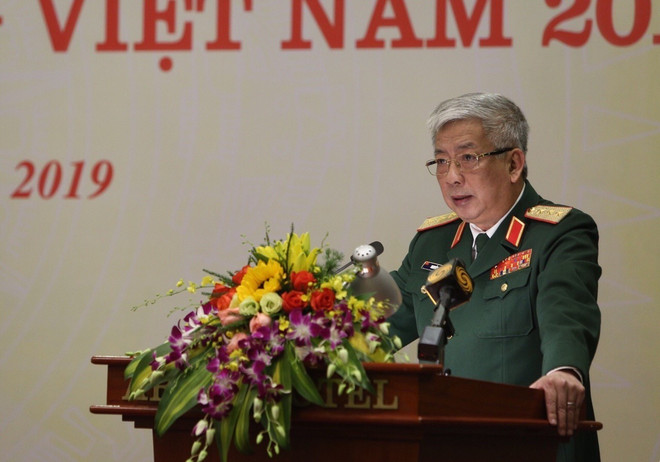 Deputy Minister of National Defence Sen. Lt. Gen. Nguyen Chi Vinh speaks at the launch of the 2019 White Paper on national defence on November 25 (Photo: VNA)
Deputy Minister of National Defence Sen. Lt. Gen. Nguyen Chi Vinh speaks at the launch of the 2019 White Paper on national defence on November 25 (Photo: VNA)Hanoi (VNA) – Peace andself-defence form the basic features of Vietnam’s defence policy, which remainsupdated since the previous edition issued in 2009, according to Deputy Ministerof National Defence Sen. Lt. Gen. Nguyen Chi Vinh.
He made the statement at the launch of the 2019White Paper on national defence on November 25.
Prior to the 2019 edition, Vietnam had releasedits White Paper in 1998, 2004 and 2009.
Vinh, who is also member of the Party CentralCommittee and the Central Military Commission, told the press that 10 yearssince the publication of the 2009 White Paper, the country’s defence policy hasyet to be outdated.
However, over the last 10 years, the strategiccontext has changed and the defence building has recorded many newdevelopments, requiring Vietnam to release this time’s White Paper, heexplained.
Vietnam wants peace and has the policy ofsettling disputes by peaceful means. It builds up defence also for the sake ofpeace, he noted.
The official said the launch of the White Paperaims to make the country’s defence policy transparent and enhance othercountries’ trust.
Regarding the White Paper’s introduction of theVietnamese military’s armament, the deputy minister said the rate of armsproduced or renovated by the country has increased, showing the country’sindependence and self-reliance in terms of weapons.
He reiterated Vietnam’s policy of concurrentlysafeguarding the nation and actively taking part in the protection of regionaland global peace and security, noting that it puts its interests and peace inthe common interests and peace of the region and the world.
With regard to the paper’s content about thecomplex developments in the East Sea and challenges to the safeguarding of thenational sovereignty, peace and stability, Vinh affirmed the country’sviewpoint of objecting to militarisation, activities that run counter tointernational law, and those complicating the situation by any countries.
Vietnam fights against those phenomena but alsocooperates with all countries to seek common interests, resolve disagreementsand differences, and create a peaceful and stable environment for theAsia-Pacific, the official stressed./.





























